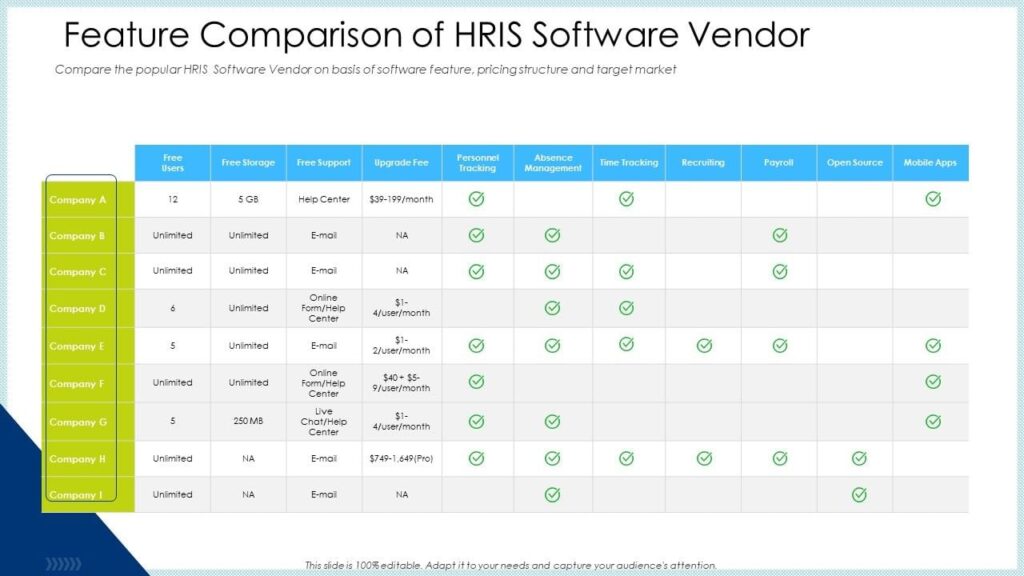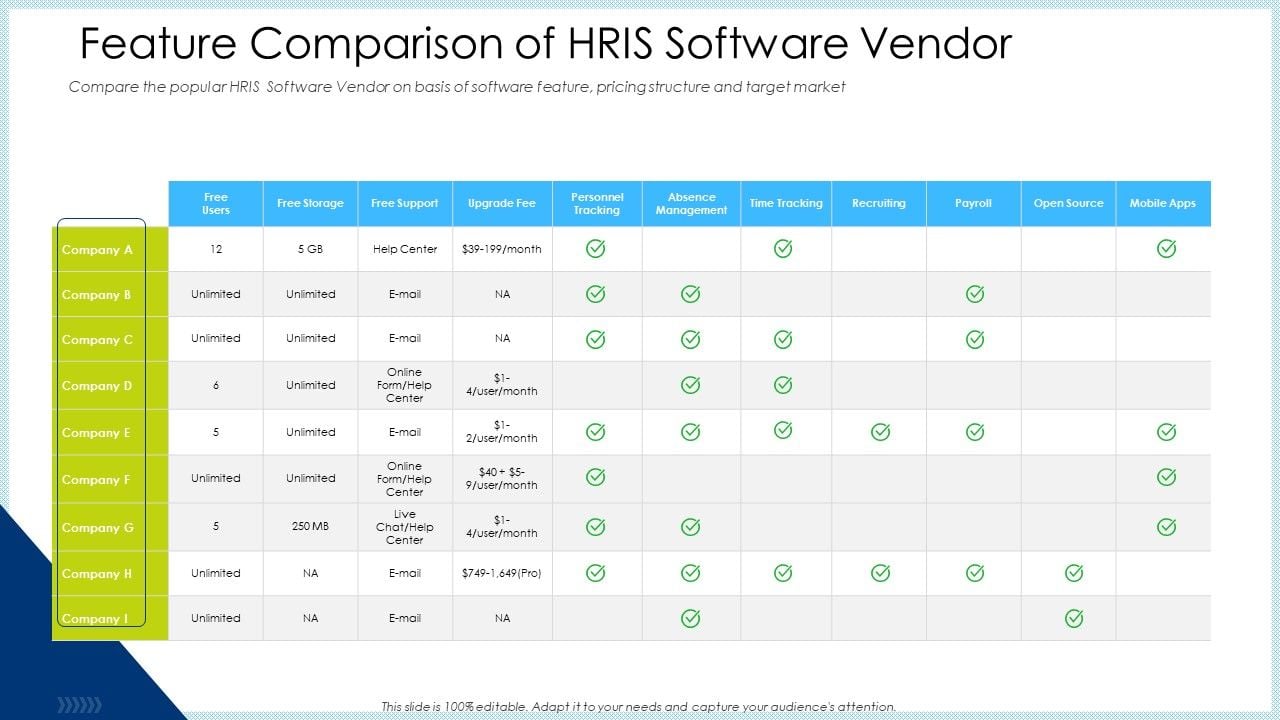Introduction
Human Resource Information Systems (HRIS) have revolutionized the way businesses manage their HR functions, from recruitment and onboarding to payroll and performance management. Selecting the right HRIS vendor is crucial for optimizing HR operations and ensuring the smooth running of these processes. This article delves into the world of HRIS vendors, exploring their offerings, key features, benefits, and the top vendors in the market today.

Understanding HRIS Vendors
What is an HRIS Vendor?
An HRIS vendor is a company that provides HRIS software solutions to organizations. These vendors develop, maintain, and support software systems designed to help businesses manage their HR functions more efficiently. HRIS vendors offer a range of solutions tailored to different business sizes and industries, ensuring that their clients can effectively manage their workforce.
Importance of Choosing the Right HRIS Vendor
Selecting the right HRIS vendor is critical for several reasons:
- Efficiency: The right HRIS can streamline HR processes, reducing the time and effort required for administrative tasks.
- Compliance: HRIS systems help ensure compliance with labor laws and regulations by automating record-keeping and reporting.
- Data Management: A good HRIS provides a centralized database for all employee information, enhancing data accuracy and accessibility.
- Scalability: As businesses grow, their HR needs evolve. Choosing a scalable HRIS vendor ensures that the system can adapt to these changes.
Key Features to Look for in an HRIS Vendor
Core HR Functions
When selecting an HRIS vendor, it’s essential to ensure that the system covers all core HR functions, including:
- Employee Information Management: Centralized storage of employee data, such as personal details, job history, and performance records.
- Payroll Management: Automated payroll processing, including wage calculations, tax withholdings, and direct deposits.
- Time and Attendance Tracking: Tools for recording work hours, managing leave balances, and ensuring compliance with labor laws.
- Benefits Administration: Management of employee benefits, including health insurance, retirement plans, and other perks.
Advanced Features
In addition to core HR functions, look for advanced features that can enhance your HR operations:
- Performance Management: Tools for setting performance goals, conducting evaluations, and tracking employee progress.
- Recruitment and Onboarding: Applicant tracking systems, job posting automation, and onboarding tools.
- Learning and Development: Training modules, course management, and employee development tracking.
- Reporting and Analytics: Comprehensive reports and dashboards for data-driven decision-making.
User Experience
The user experience (UX) is a critical factor when selecting an HRIS vendor. Ensure that the system is intuitive and easy to navigate for both HR professionals and employees. A user-friendly interface reduces the learning curve and enhances overall adoption.
Integration Capabilities
Integration capabilities are essential for seamless HR operations. Ensure that the HRIS can integrate with other business systems, such as accounting software, ERP systems, and third-party applications. This enhances data flow and reduces manual data entry.
Customer Support
Reliable customer support is crucial for addressing any issues that arise during the implementation and use of the HRIS. Look for vendors that offer comprehensive support services, including phone, email, and live chat support. Additionally, consider vendors that provide training resources and ongoing support.
Top HRIS Vendors
1. ADP Workforce Now
Overview
ADP Workforce Now is a comprehensive HRIS solution designed for businesses of all sizes. It offers a wide range of HR functions, including payroll, time and attendance, benefits administration, and talent management.
Key Features
- Payroll and Tax Management: Automated payroll processing, tax filing, and compliance.
- Time and Attendance: Tools for tracking work hours, managing leave balances, and scheduling.
- Benefits Administration: Management of health insurance, retirement plans, and other benefits.
- Talent Management: Recruitment, onboarding, performance management, and learning and development.
- Reporting and Analytics: Detailed reports and dashboards for data-driven decision-making.
Benefits
ADP Workforce Now is known for its robust feature set and scalability. It provides a comprehensive solution for managing HR functions, ensuring compliance, and improving overall efficiency. The system’s integration capabilities and user-friendly interface make it a popular choice for businesses.
2. BambooHR
Overview
BambooHR is an HRIS solution designed specifically for small and medium-sized businesses. It offers a range of HR functions, including employee information management, performance management, and recruitment.
Key Features
- Employee Information Management: Centralized storage of employee data.
- Performance Management: Tools for setting goals, conducting evaluations, and tracking progress.
- Recruitment and Onboarding: Applicant tracking, job posting automation, and onboarding tools.
- Time and Attendance: Tools for recording work hours and managing leave balances.
- Employee Self-Service: Self-service portal for employees to access their information and manage benefits.
Benefits
BambooHR is known for its user-friendly interface and robust feature set. It helps small and medium-sized businesses streamline their HR processes, improve data accuracy, and enhance employee satisfaction. BambooHR also offers extensive reporting and analytics capabilities to support data-driven decision-making.
3. Workday HCM
Overview
Workday HCM is a cloud-based HRIS solution designed for large enterprises. It offers a comprehensive suite of HR functions, including payroll, benefits administration, talent management, and workforce planning.
Key Features
- Payroll and Benefits: Automated payroll processing, tax filing, and benefits administration.
- Talent Management: Recruitment, onboarding, performance management, and learning and development.
- Workforce Planning: Tools for workforce analytics, budgeting, and forecasting.
- Time and Attendance: Tools for recording work hours and managing leave balances.
- Reporting and Analytics: Comprehensive reports and dashboards for data-driven decision-making.
Benefits
Workday HCM is known for its scalability and advanced features. It provides a robust solution for managing HR functions, ensuring compliance, and improving overall efficiency. Workday HCM’s integration capabilities and user-friendly interface make it a popular choice for large enterprises.
4. Paycor
Overview
Paycor is a cloud-based HRIS solution designed for small and medium-sized businesses. It offers a comprehensive suite of HR functions, including payroll processing, benefits administration, and performance management.
Key Features
- Payroll Processing: Automated payroll calculations, tax filings, and direct deposits.
- Benefits Administration: Tools for managing health insurance, retirement plans, and other employee benefits.
- Employee Information Management: Centralized repository for employee records.
- Performance Management: Tools for setting goals, conducting evaluations, and tracking progress.
- Time and Attendance: Tools for recording work hours and managing leave balances.
- Reporting and Analytics: Detailed reports and dashboards for data-driven decision-making.
Benefits
Paycor is known for its intuitive interface and ease of use. It simplifies payroll processing and benefits administration, making it an ideal choice for small and medium-sized businesses. Paycor also offers robust reporting and compliance features to ensure regulatory compliance and reduce risk.
5. SAP SuccessFactors
Overview
SAP SuccessFactors is a comprehensive HRIS solution designed for enterprises of all sizes. It offers a wide range of HR functions, including employee information management, payroll, performance management, and learning and development.
Key Features
- Employee Information Management: Centralized storage of employee data.
- Payroll and Benefits: Automated payroll processing, tax filing, and benefits administration.
- Performance Management: Tools for setting goals, conducting evaluations, and tracking progress.
- Learning and Development: Training modules, course management, and employee development tracking.
- Recruitment and Onboarding: Applicant tracking, job posting automation, and onboarding tools.
- Reporting and Analytics: Comprehensive reports and dashboards for data-driven decision-making.
Benefits
SAP SuccessFactors is known for its scalability and advanced features. It provides a robust solution for managing HR functions, ensuring compliance, and improving overall efficiency. SAP SuccessFactors’ integration capabilities and user-friendly interface make it a popular choice for enterprises.
Choosing the Right HRIS Vendor
Assessing Business Needs
The first step in choosing the right HRIS vendor is to assess your business needs. This involves identifying the specific HR challenges you face, the features you require, and your budget. A thorough needs assessment helps in selecting the right HRIS solution that aligns with your business objectives.
Evaluating Vendors
When evaluating HRIS vendors, consider the following factors:
- Feature Set: Ensure that the HRIS covers all core HR functions and offers advanced features that can enhance your HR operations.
- Scalability: Choose a scalable solution that can grow with your business and adapt to changing HR needs.
- User Experience: Select a system with an intuitive interface that is easy to navigate for both HR professionals and employees.
- Integration Capabilities: Ensure that the HRIS can integrate with other business systems, such as accounting software, ERP systems, and third-party applications.
- Customer Support: Look for vendors that offer comprehensive support services, including phone, email, and live chat support. Additionally, consider vendors that provide training resources and ongoing support.
Implementation and Training
Successful implementation of an HRIS involves careful planning and training. Develop a detailed implementation plan that outlines the steps involved, from initial setup and data migration to testing and deployment. Provide comprehensive training to HR staff and employees on how to use the HRIS platform effectively. This includes understanding its features, navigating the interface, and troubleshooting common issues.
Monitoring and Optimization
After the HRIS platform is deployed, continuously monitor its performance and effectiveness. Use the reporting and analytics features to track key metrics and identify areas for improvement. Regularly review and optimize the HRIS configuration to ensure it aligns with your evolving business needs and HR management goals.
Conclusion
Choosing the right HRIS vendor is crucial for optimizing HR operations and ensuring the smooth running of HR processes. By assessing business needs, evaluating vendors, and providing comprehensive training, organizations can select an HRIS solution that aligns with their business objectives and supports their growth.
Top HRIS vendors such as ADP Workforce Now, BambooHR, Workday HCM, Paycor, and SAP SuccessFactors offer comprehensive solutions tailored to different business sizes and industries. These vendors provide robust features, scalability, and user-friendly interfaces, making them ideal choices for managing HR functions efficiently and effectively.
With the right HRIS vendor, organizations can achieve greater efficiency, data accuracy, and employee satisfaction, positioning themselves for long-term success in a competitive business environment.
